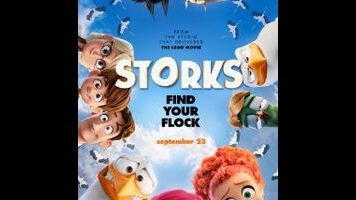Storks delivers all the jabbering of your typical big-studio cartoon

In half a dozen Warner Bros. cartoons in the 1940s and 1950s, plots are set in motion by the mistakes of a drunken stork, which is supposed to deliver babies but sometimes winds up delivering, say, Bugs Bunny to a family of gorillas. The 2016 Warner Bros. cartoon Storks focuses more intently on these winged creatures’ sleek professionalism. The storks, who operate from a mountaintop base far above the earth, have long since halted the production and delivery of human children (“There are so many other ways of getting babies,” one parent nonchalantly explains) and now operate an Amazon-like fulfillment center and delivery business. Their corporatization could be read as a sly joke or an un-ironic sign of the times.
The business is run by the imposing Hunter (Kelsey Grammer, overacting to a degree that might even shame Sideshow Bob), who intends to promote star performer Junior (Andy Samberg) if he can just perform one minor task: Fire the accident-prone Tulip (Katie Crown), the outfit’s sole human employee and the result of a delivery mishap that left the whereabouts of her parents unknown. (She’s casually referred to as “Orphan Tulip” by the other storks.) Before Tulip can be let go, she accidentally fires up the long-dormant baby-making device, granting the wish of young Nate (Anton Starkman) for the younger sibling that his work-obsessed parents (Ty Burrell and Jennifer Aniston) refuse to provide. Tulip and Junior must then deliver this baby without Hunter finding out.
This is a lot of plot for a movie that endeavors primarily to entertain children, though the excess is more likely to give adults a headache. The newest incarnation of Warner’s animation house, Warner Animation Group, debuted with The Lego Movie, and while Storks isn’t produced in the same distinctive imitation-stop-motion style (in fact, the animation itself was apparently outsourced to Sony), it does attempt to adopt the Lego style of rapid-fire visual and verbal delivery. This works well enough in speeding through the story’s convolutions, but less so in the landing of jokes. The filmmakers’ assumption appears to be that if lines are said very fast and in silly voices, they will become funny.
Much of Junior’s dialogue, for example, relies on Samberg’s worst tics as a (generally very funny) comic actor. One is announcing and explaining jokes with would-be hilarious bluntness: “I did not think that through!” after performing an impulsive action, for example. This happens roughly 50 times in Storks, all of these lines essentially chasing Anchorman’s “Milk was a bad choice!” without Will Ferrell’s deranged commitment. Samberg also sometimes tries to put a funny spin on a line by changing pronunciation or accent on the last few words (e.g., his “noice” for “nice” on Brooklyn Nine-Nine), something that almost every voice actor here pursues in hopes of imposing additional zaniness on the material.
Like so many big-studio cartoons, Storks doesn’t seem to understand that its strengths lie not in the speed or volume of its dialogue, but the energy of its animation. Katie Crown, who has the most voice-over experience of the main cast, also gives the strongest vocal performance as the sweet-natured Tulip, and she’s helped immeasurably by her character’s springy design, complete with a giant poof of curly red hair tied up at the top of her head. One of the movie’s best, weirdest sequences has Tulip turning an empty warehouse into an office fully staffed by characters of her own creation. There’s similarly bizarre invention when Keegan Michael-Key and Jordan Peele turn up as a pair of wolves who lead an impossibly flexible pack.
These little digressive set pieces improve the movie’s laugh quotient, and writer-director Nicholas Stoller works some surprisingly accurate observations about early parenthood into the scenes where Tulip and Junior attempt to care for the new baby (who emerges from the baby machine acting more like a six-month-old than a newborn). Sometimes Stoller—who has collaborated with Judd Apatow, Seth Rogen, and Jason Segel and co-wrote two very funny Muppet movies—seems to be taking lessons from the Apatow school of enforced domestication, especially when it comes to the subplot about Jake defying his parents’ desire for a mere one child. But the movie manages some sweet family-related grace notes in the end.
Of course, those grace notes follow an unnecessarily noisy action climax. Both the tributes to family and the thoughtlessly frenetic jabbering are, in their own ways, pretty far afield from the classic Warner Bros. sensibility, and smack in the middle of what other second-tier animation houses are producing. The Lego Movie brought with it the hope that the studio might reclaim some of the animation territory it has long ceded to other studios. Storks, though, is just another okay cartoon.